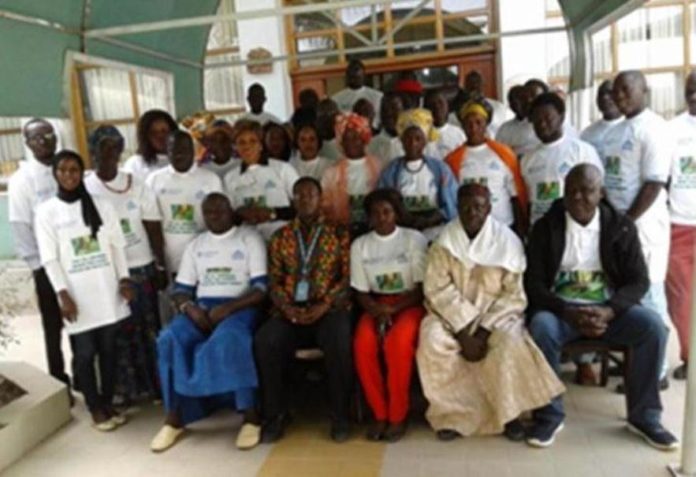By Fatoumatta K Jallow/Abdoulai G. Dibba
The Food and Agriculture Organization of the United Nations (FAO), in collaboration with the Ministry of Agriculture, on Saturday 23rd December 2017, sensitized members of the National Assembly, Agric. Communicators and Farmers, on the Fall Army worms (FAW), which is a new pest in Africa, and is trans-boundary. The pest causes damage to maize, rice, sorghum, millet and pastures, and can also feed on other crops.
Mustapha Cessay, a representative of FAO Country Office said during the last 12 months, there has been a development in African agriculture that deserves the attention of Governments and the farming community; that an insect pest called Fall Armyworm (Spodoptera frugiperda) devastated food crops in several countries in west, east, central and Southern Africa; that the pest feeds on more than 80 crop species, causing damage to cereals, legumes as well as crops such as cotton.
Ceesay said the pest was first detected in central and western Africa in early 2016, and that it is expected to spread further; that the pest is native to tropical and subtropical regions of the Americas; that the adult moth is able to move over 100 km per night and over 2,000 km during its life cycle and it lays its eggs on plants, from which a larva hatches and begins to feed on plant tissues.
Mr. Ceesay indicated that a high infestation of the pest can lead to significant yield loss as currently experienced in Ghana, Kenya and southern Africa; that control measures are so far not very effective, or at high cost, when available.
“Although it is too early to know the long-term impact of the Fall Army Worm on agricultural production and food security, indications are that it has the potential to cause serious damage to crops, cause significant yield losses and threaten national household food and nutrition security” Ceesay pointed out; that the Fall Armyworm’s presence in Africa is not likely to be reversed and large-scale eradication efforts are neither appropriate nor feasible.
The FAO representative said it is important that they sensitize stakeholders in the agriculture for participants to extend the message to other farmers, researchers, extension staff, students, development partners and all other stakeholders at grass-roots and policy levels.
“It is important to quickly prepare a national contingency plan that will involve gathering information locally and drawing lessons from experiences and best practice in countries where the pest has been successfully controlled” he noted.
He said FAO will continue to support the Government and the Ministry of Agriculture to effectively and sustainably manage the Fall Armyworm which threatens national food and nutrition security in The Gambia. He reassured the gathering that FAO is committed to provide support in the area of plant pest and disease control, as well as in interventions that assist Government and the people of The Gambia, attain household and national food and nutrition security, eradicate poverty and attain development goals that will sustainably improve the lives of people.
Hon. Omar Darboe a Member of the Nation Assembly Select Committee on Agriculture indicated that the pest is devastating in its level of destruction and there is need to enlighten people on how dangerous it is. He urged the gathering to spread the massage so that the people who are not present will be aware especially the farmers.
The Director General of the Department of Agriculture Sariyang Jobarteh, said the pest can be one of the most difficult insect pest to control in the field; that late planted fields and late maturing hybrids are more likely to become infected; that the Ministry of Agriculture together with FAO, constituted a multi-disciplinary team which offers hope that the Gambia can effectively give the pest a knockout blow and protect food crops; that the insect pest can inflict heavy damage on crops within a short time if it is not stopped.
Jobarteh said Government with support from FAO, is intensifying efforts to contain the pest within the country; that intensive awareness campaign will be held through provincial meetings and media; that the Ministry of Agriculture and FAO will embark on a conducted awareness raising meetings at the provincial and district levels, educating local leaders, agronomist and farmers about the new pest, its negative impact and methods of control.
Amongst these will be radio and television talk shows to sensitize the public about the new pest through public, private and community radios, Jobarteh concluded
















